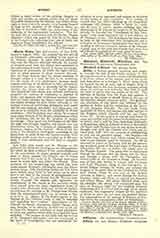

Aetius, a Roman general, patrician, and consul, b. towards the end of the fourth century; d. 454. He was the son of an Italian mother and Gaudentius, a Scythian soldier of the empire, and in his youth had been given as a hostage to Alaric (from whom he learned the art of war), and to Rugila, King of the Huns, and in this way, doubtless, acquired among them the prestige and authority that were at once his basis of power and the source of his fall. This deliverer of Europe from the Huns first appears in history as the leader of 60,000 Huns in the pay of the imperial usurper Johannes (424). The ignominious execution of the latter was followed by the pardon of Aetius and his restoration to the favor of the Empress Placidia. He was made Count (probably of Italy), and became the chief adviser of the Western rulers, Placidia and her son Valentinian III. In this quality it was not long before he came into conflict with the powerful Bonifacius, Count of Africa, and is said by later historians (Procopius of Byzantium, John of Antioch) to have so discredited the latter with Placidia that he was driven to revolt, brought over (428) the Vandals into Africa, and entered Italy (432) with the purpose of overthrowing in civil war his powerful enemy. But Boniface fell in battle near Rimini, and Aetius retired for some time to the Hunnish camp in Pannonia. In 433 he returned to power at Ravenna, and for the remaining seventeen years of the joint reign of Placidia and Valentinian III was, as before, the ruling spirit of the Western Empire. The peace that he maintained through his alliances with the Huns and the Alani and through a treaty with the Ostrogoths, was broken (450) by the invasion of Attila. In the summer of that year Aetius, in concert with the brave and loyal Theodoric, King of the Ostrogoths, relieved Orleans besieged by Attila, and arrested the progress of the great Hun on the Catalaunian Fields, near Troyes, where he won one of the decisive victories of history, and saved Europe for Latins, Teutons, Celts, and Slays, as against the degraded and odious Huns. His death followed close upon his triumph; this strong and resourceful man was slain at Ravenna (454) by the weakling Emperor Valentinian III, in a fit of jealous rage, never clearly explained, but supposedly caused by the ambition of Aetius to place his son upon the imperial throne. The assassination of the savior of Western civilization led to the assassination (455) of Valentinian.
THOMAS J. SHAHAN

